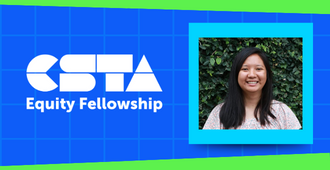Michaela De Guzman is a curriculum developer at Girls Who Code. She began her career teaching K–6 coding in Title I schools, which sparked her love for computer science education. Ever since, she’s been committed to helping students find empowerment and express themselves through code. In her three years with Girls Who Code, she’s developed courses in data science and cybersecurity that emphasize social justice values, and she works hard to elevate student voices in tech spaces, especially those students from demographics that have historically been underrepresented in computer science.
Michaela believes that tech can be a vital tool for helping students express creativity, explore their identities, and pursue their passions. Girls Who Code puts community at the heart of their curriculum, encouraging students to support each other within and beyond the classroom. They facilitate connection through Discord servers, and students participate in synchronous “Sisterhood Activities,” all of which allows them to get to know each other beyond just computer science. These efforts, says Michaela, “make students feel comfortable bringing their whole selves, taking risks, and learning from mistakes on their CS journeys.”
She’s also intentional about recruiting students from marginalized groups (BIPOC students, girls and nonbinary students, English-language learners, etc.) and strives to build curricula that reflect the myriad identities of CS students. Within Girls Who Code, Michaela works to build her team’s expertise in culturally responsive teaching, and she co-led her organization’s implementation of NYU Steinhardt’s Culturally Responsive Curriculum Scorecard and the Kapor Center’s Culturally Responsive-Sustaining Computer Science Framework. To ensure that student and teacher voices are reflected in her work, she is currently leading a community research project to solicit curriculum feedback from past and present Girls Who Code participants. Armed with this feedback, she’ll be able to make sure that she’s developing engaging curricula with real-world relevance for the students she serves.
In all she does, Michaela prioritizes values-focused CS education. Her cybersecurity and data science courses are designed to be self-paced to accommodate students’ different schedules and responsibilities. Both courses ask students to reflect on the biases that exist in creating tech, and the cybersecurity course highlights organizations that work to make the field more equitable. It also asks students to consider security risks in their own communities, including the impact of different socioeconomic levels on cybersecurity, and to offer advice to those communities on how to stay cyber-safe.
When students can draw connections between CS and their own lives, they’re more likely to persist in the field, and to feel that all-important sense of belonging in tech. Michaela says, “It’s crucial for students to not only learn about the technical concepts of CS, but also the ethical side and how representation and diversity affects the designs of the technologies that shape our society.”
Michaela loves her work but notes that she “misses the opportunity to develop relationships on the ground with teachers and students.” In her time as a CSTA Equity Fellow, she’s eager to connect with classroom teachers to learn about the challenges they’re facing, so that she can support them more effectively in her role as curriculum developer. “We all know that lesson plans don’t always go exactly as planned,” she points out, and she looks forward to learning about the supports and resources teachers and students need to continue growing in their computer science journeys.
In service of this goal, she’d love to create resources and guidance to help CS teachers create a community of debuggers. She believes that such a community would help students and teachers to learn from each other and accept mistakes as a vital step in the problem-solving process. She would like to find ways to co-create CS activities alongside students, incorporating student identity and social justice concepts along the way. Finally, she’s eager to explore alternative histories of computer science, creating activities and exercises that can reimagine technology to be more inclusive to all students and communities.
“True equity can only be achieved through collaboration of diverse voices and perspectives,” says Michaela. “My dream is for every student to feel empowered to shape our technologies to create more inclusive and equitable designs and, therefore, a more inclusive and equitable world.”

